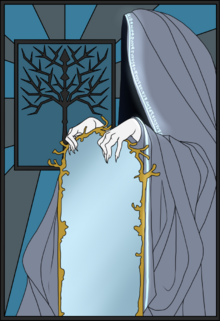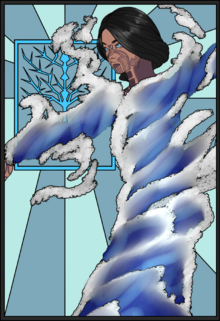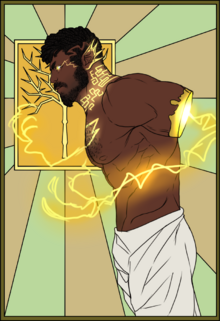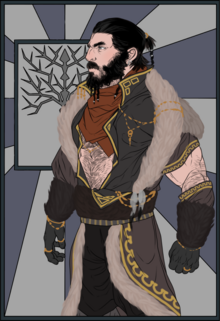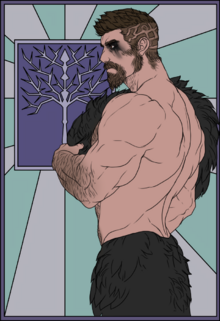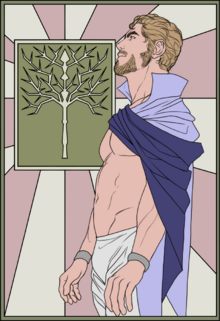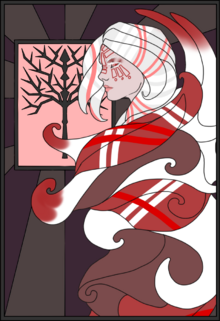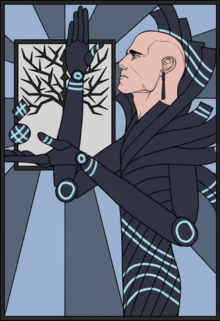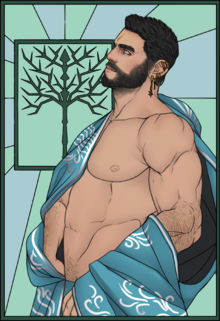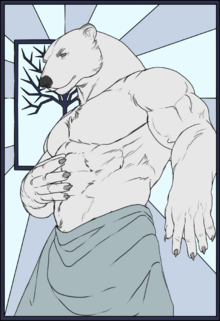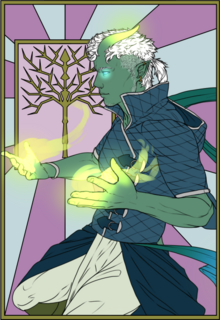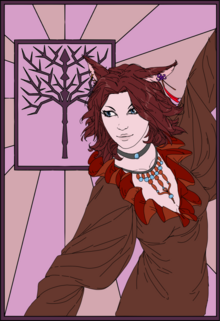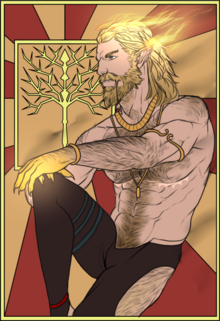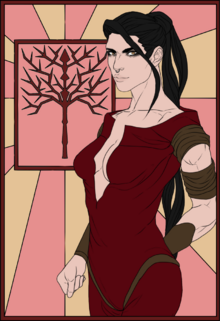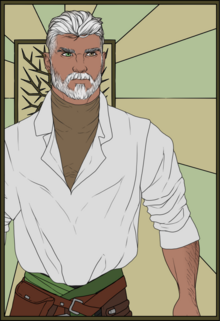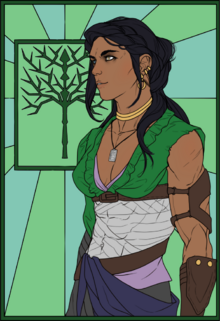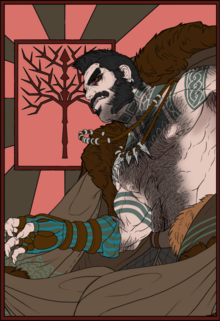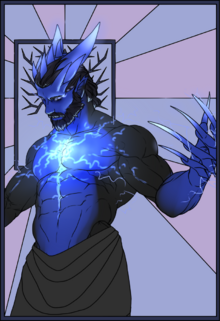More actions
No edit summary |
No edit summary |
||
| Line 28: | Line 28: | ||
* '''Conversion:''' Old Gods as a religion does not require preaching or spreading through missionaries, which is usually a practice reserved for [[Estellon]] and [[Unionism]], though to say it is without violent impression is false. Among Old Gods worshipers, holy wars can rage between two distinct populations over small denominational ideals (some as ridiculous as the believed hair color of a god), but bigger conflicts arise with other religions. Old Gods worshipers in general are very intolerant to other religions mostly born out of necessity, because disloyalty to the gods (for example by converting from Old Gods to Unionism) means a complete loss of Soldi and thus a soul being condemned to the Mirror world. Old Gods worshipers have been known to force their faith at the end of a sword and axe, especially in the far north where they are in the majority. Old Gods worshipers also frequently deface religious symbols of other faiths or engage in desecration of holy sites. | * '''Conversion:''' Old Gods as a religion does not require preaching or spreading through missionaries, which is usually a practice reserved for [[Estellon]] and [[Unionism]], though to say it is without violent impression is false. Among Old Gods worshipers, holy wars can rage between two distinct populations over small denominational ideals (some as ridiculous as the believed hair color of a god), but bigger conflicts arise with other religions. Old Gods worshipers in general are very intolerant to other religions mostly born out of necessity, because disloyalty to the gods (for example by converting from Old Gods to Unionism) means a complete loss of Soldi and thus a soul being condemned to the Mirror world. Old Gods worshipers have been known to force their faith at the end of a sword and axe, especially in the far north where they are in the majority. Old Gods worshipers also frequently deface religious symbols of other faiths or engage in desecration of holy sites. | ||
* '''Sins & Taboo:''' The worst cases of sinning and taboo for Old Gods are disloyalty to god, family and one's leaders, backstabbing, betrayal, deceit for greed's sake, and refusing a challenge of honor or duel of honor and abiding by cowardice. Never does a single sin or transgression cause Soldi to be lost fully, it is more like a currency that slowly leaks away, however repeat offenses do cause eventual loss of Soldi altogether. Old Gods does not really have a central body of priests to condemn a person, but generally speaking, Old Gods communities have a very communal sense of expelling a member when they believe their Soldi to be too far gone. | * '''Sins & Taboo:''' The worst cases of sinning and taboo for Old Gods are disloyalty to god, family and one's leaders, backstabbing, betrayal, deceit for greed's sake, and refusing a challenge of honor or duel of honor and abiding by cowardice. Never does a single sin or transgression cause Soldi to be lost fully, it is more like a currency that slowly leaks away, however repeat offenses do cause eventual loss of Soldi altogether. Old Gods does not really have a central body of priests to condemn a person, but generally speaking, Old Gods communities have a very communal sense of expelling a member when they believe their Soldi to be too far gone. | ||
=Gods and Goddesses= | |||
Old Gods | Old Gods is a unique religion in that it has two distinct pantheons, one larger Vanir, and one smaller Aesir. The Vanir are what is considered "natural", born from Arne, the Tree of Life, from which all Ailorkind was born (in the eyes of the Old Gods believers). There is no origin story for the world, though it is very much implied that Aerne is actually the world, and that the great tree is only a physical representation of the world's spirit. The Aesir are foreign, entities from a hellish place that have become gods by forcing their way into the Old Gods pantheon. Morality between all these gods is never so clearly black and white, some of the Vanir do reprehensible things for good reasons, or show indifference and silence to the suffering of mortals, while the Aesir are cruel and unforgiving, but grant so much more power to their faithful with a bargain of free will. There are parts of Old Gods society that worship one pantheon while reviling the other, and then there are parts that worship all of them, each in their own way. For more information, consult the [[Velheim Culture]] Page. Dragons are somewhat acknowledged in Old Gods folklore, remarking that they were "beings before being", and sat at the roots of Arne before the first birth, they are considered ancient and powerful, but not godlike. Arne does not have a distinct identity of its own, it is more a cosmic force, which is why the Tree of Life is seen as a symbol, nothing more, to the religion. Old Gods both has a Velheim and a Cellik (Cearden) Variant, where the identities are the same, but names differ. | ||
==Vanir== | |||
The Vanir are created in so called Unions. Nidda and Bev are the Union of Water associated with death, Adal and Dáuw are the Union of Life associated with loss, Bard and Njal are the Union of air associated with power, Gro and Jord are the Union of Life associated with time, Halfvel and Asbjørn are the Union of Mind associated with free-will, Frode and Toke are the Union of Seasons associated with change, Leif and Astrid are the Union of Fire associated with passion, and Hagen and Tove are the Union of Earth associated with thought. | |||
===Bev, Mirror of Life=== | ===Bev, Mirror of Life=== | ||
{| | {| | ||
| Line 41: | Line 43: | ||
*'''Individual:''' Bev does not manifest to individuals or groups at all, as he is only ‘met’ when someone’s soul is passing on for judgement. He is rumored to have made the Vaarda Gates however. | *'''Individual:''' Bev does not manifest to individuals or groups at all, as he is only ‘met’ when someone’s soul is passing on for judgement. He is rumored to have made the Vaarda Gates however. | ||
*'''Worship House:''' Bev is worshipped in Old Gods Crypts, or Helbolwen, where a statue in his likeness with a mirror is kept. These mirrors reflect hundreds of lit candles, to represent the dead. | *'''Worship House:''' Bev is worshipped in Old Gods Crypts, or Helbolwen, where a statue in his likeness with a mirror is kept. These mirrors reflect hundreds of lit candles, to represent the dead. | ||
*'''Relations:''' Bev is the husband of | *'''Relations:''' Bev is the husband of Nidda, doomed to never embrace, as he cannot leave the water, and she cannot enter it. He is also tasked to hold up the Mirror, which Nidda would destroy. | ||
*'''Other Notes:''' It is believed that if Bev should ever drop the Mirror, it will shatter, and release the Soldi-less dead who reside within it, causing a terrible undead cataclysm to occur. | *'''Other Notes:''' It is believed that if Bev should ever drop the Mirror, it will shatter, and release the Soldi-less dead who reside within it, causing a terrible undead cataclysm to occur. | ||
* '''Cellik Variant:''' The Cellik Variant of Bev is called Cyne or Cyneweard, and as opposed to a mirror, he holds up a silver door. All other aspects are identical. | * '''Cellik Variant:''' The Cellik Variant of Bev is called Cyne or Cyneweard, and as opposed to a mirror, he holds up a silver door. All other aspects are identical. | ||
|} | |} | ||
=== | ===Nidda, Dancer of Death=== | ||
{| | {| | ||
|[[File:Flying clothfyhgsb'.png|220px|thumb|left]] | |[[File:Flying clothfyhgsb'.png|220px|thumb|left]] | ||
| | | | ||
*'''Identity:''' | *'''Identity:''' Nidda is the first daughter of Arne, who was born when the river flooded the Tree of Life and touched its bark, thus familiarizing it with large amounts of water. | ||
*'''Themes:''' | *'''Themes:''' Nidda's themes are water, the ocean, protection from the waves, misery, unrequited love, and abandonment. She is intensely linked with Bev due to their relation. | ||
*'''Depictions:''' | *'''Depictions:''' Nidda is a lithe woman with many tattoos and a body or dress made of the torrential waves. Her anguish and loneliness cause her to be cruel and whimsical. | ||
*'''Worship:''' | *'''Worship:''' Nidda is worshiped only by those who go off to sea, or know someone who is going off to sea, praying for their safe travel and return by dancing and offering her company and song. | ||
*'''Manifestation:''' It is believed that every great typhoon, hurricane, tsunami, and waterspout, is | *'''Manifestation:''' It is believed that every great typhoon, hurricane, tsunami, and waterspout, is Nidda's manifestation, and that each of them are her physical presence. | ||
*'''Individual:''' | *'''Individual:''' Nidda has not touched anyone individually per se, rather she has supposedly caused the deaths of thousands of sailors, dragged to an early grave under the ocean. | ||
*'''Worship House:''' | *'''Worship House:''' Nidda's shrines are built on cliff sides near oceans, her cult is called the Sea-Dancers, water mages who ‘dance’ with their magic on ships to protect them from her wrath. | ||
*'''Relations:''' | *'''Relations:''' Nidda is the wife of Bev, but she cannot touch or be with him, as he resides below the ocean, and she can only dance on the surface of it: the source of her anguish. | ||
*'''Other Notes:''' | *'''Other Notes:''' Nidda is considered the goddess who takes lives, and knows when all Old Gods worshippers will die. This is mostly why Nidda is feared rather than admired. | ||
* '''Cellik Variant:''' The Cellik Variant of | * '''Cellik Variant:''' The Cellik Variant of Nidda is called Flaed or Flæd, and she is traditionally associated more with river water than ocean water, and subsequent floods and droughts. | ||
|} | |} | ||
===Adal, Prince of Forgiving=== | ===Adal, Prince of Forgiving=== | ||
{| | {| | ||
| Line 76: | Line 77: | ||
* '''Cellik Variant:''' The Cellik Variant of Adal is Glaed or Glæd, and as opposed to thunder and lightning, he is more representative of light and the sun. | * '''Cellik Variant:''' The Cellik Variant of Adal is Glaed or Glæd, and as opposed to thunder and lightning, he is more representative of light and the sun. | ||
|} | |} | ||
=== | ===Dáuw, King of Mountains=== | ||
{| | {| | ||
|[[File: | |[[File:Dawuw.png|220px|thumb|left]] | ||
| | | | ||
*'''Identity:''' | *'''Identity:''' Dáuw, King of Mountains, was not born with the pantheon, but a Dwarven God who stumbled upon the Tree of Life, and joined the pantheon by sheer willpower. | ||
*'''Themes:''' | *'''Themes:''' Dáuw's themes are Mountains, Grudges, Righteousness, Survival, Stone, Construction, the heat of the forge, and raging against the dying of the light. | ||
*'''Depictions:''' | *'''Depictions:''' Dáuw looks like a normal Dwarf male, though living among Mortals, is always followed by the sound of the echoing caves and the sparkle of wealth. | ||
*'''Worship:''' | *'''Worship:''' Dáuw worship takes the form of offering grudges for completion to a statue in his likeness, or tossing coins at strangers and making wishes. | ||
*'''Manifestation:''' | *'''Manifestation:''' Dáuw is the only Old God who lives among the mortals every single day, and is houses in the Great Chamber of the surviving Rammuur Hold. | ||
*'''Individual:''' | *'''Individual:''' Dáuw remains among the Dwarves to offer them guidance, but does not give much personal directives, only general plans and hints on how to survive. | ||
*'''Worship House:''' | *'''Worship House:''' Dáuw's largest temple is the Great Chamber, which is an inner sanctum within Rammuur that only chosen priests are allowed to enter. | ||
*'''Relations:''' | *'''Relations:''' Dáuw's relation with the other Old Gods is somewhat frosty. While he is accepted by the Pantheon by will of the Tree of Life, they ignore him too. | ||
*'''Other Notes:''' Dáuw was once far more proactive in trying to help the Dwarves, but has slowed down and been seen less and less as time has passed. | |||
*'''Other Notes:''' | * '''Cellik Variant:''' The Cellik Variant of Dáuw is still called Dáuw, because this word is close to a Cearden word for revenge and absolution in justice. | ||
* '''Cellik Variant:''' The Cellik Variant of | |||
|} | |} | ||
===Bard, King of Bears=== | ===Bard, King of Bears=== | ||
| Line 109: | Line 108: | ||
* '''Cellik Variant:''' The Cellik Variant of Bard is called Brom, and he is effectively identical, though the animal associated with him is the wolf instead of the bear. | * '''Cellik Variant:''' The Cellik Variant of Bard is called Brom, and he is effectively identical, though the animal associated with him is the wolf instead of the bear. | ||
|} | |} | ||
===Njal, Prince of Art=== | ===Njal, Prince of Art=== | ||
{| | {| | ||
| Line 276: | Line 274: | ||
* '''Cellik Variant:''' The Cellik Variant of Tove is called Cihnt (pronounced as see-h't), and she is identical to the Velheim Old Gods variant. | * '''Cellik Variant:''' The Cellik Variant of Tove is called Cihnt (pronounced as see-h't), and she is identical to the Velheim Old Gods variant. | ||
|} | |} | ||
=== | ==Aesir== | ||
===Rand, The Great Betrayer=== | ===Rand, The Great Betrayer=== | ||
{| | {| | ||
| Line 304: | Line 288: | ||
*'''Relations:''' Rand is hated by every Old God, including the Tree of Life, but Jord and Gro made a faustian bargain with him, resulting in their expulsion from worship. | *'''Relations:''' Rand is hated by every Old God, including the Tree of Life, but Jord and Gro made a faustian bargain with him, resulting in their expulsion from worship. | ||
*'''Other Notes:''' Rand is commonly accepted by Ailor and Nelfin scholars, to actually be the Power Arken, who is also the main antagonist of the Dwarves. | *'''Other Notes:''' Rand is commonly accepted by Ailor and Nelfin scholars, to actually be the Power Arken, who is also the main antagonist of the Dwarves. | ||
*'''Other Notes:''' While the Vanir don't have a God among Gods, Rand fulfills this role among the Aesir, seen as the King of the Aesir and the most powerful one. | |||
*'''Other Notes:''' It is said to whisper ill or destroy that which belongs to Rand, allows him by Old Gods Law to claim the soul of the defiler, something that scares many. | |||
* '''Cellik Variant:''' The Cellik variant of Rand is called Devil, so that this word also exists in our lore and can be used without breaking canon phrasology. | * '''Cellik Variant:''' The Cellik variant of Rand is called Devil, so that this word also exists in our lore and can be used without breaking canon phrasology. | ||
|} | |} | ||
===Odal, Prince of Vengeance=== | |||
{| | |||
|[[File:Treetyujgrfhgdfh.png|220px|thumb|left]] | |||
| | |||
*'''Identity:''' Odal is the son of Bard, born when Bard’s anger caused a thunderstorm that cut branches off of the Tree of Life, crushed a family of hedgehogs below. | |||
*'''Themes:''' Odal’s themes are revenge, overcoming, conquest, magic, corruption, and the indomitable spirit. Odal is sometimes considered good, sometimes evil. | |||
*'''Depictions:''' Odal was once a Vanir, but became an Aesir, angered by the inaction of the other Gods at the suffering of mortals, his spirit was corrupted by the Betrayer. | |||
*'''Worship:''' Odal worship is offering him food and goods in a ritual fire to stave off his vengeance. Odal’s Avengers is a cult of for-hire revenge seekers, called Odalv. | |||
*'''Manifestation:''' Odal has been known to personally manifest, particularly to protect the respect and honor of the Great Betrayer, when Old Gods worshipers defile him. | |||
*'''Individual:''' There are many tales of Odal showing up to kill Vanir fanatics attacking Aesir priests and faithful, as well as sinking whole fleets set to attack Vaarda. | |||
*'''Worship House:''' Odal has lingering shrines decorated with blue-painted horns, but only because people are afraid he’d destroy them if they destroyed his shrines. | |||
*'''Relations:''' Odal is the twin brother of Adal, and is constantly fighting Bard to force his will onto the Vanir, It is said only he can challenge Bard. | |||
*'''Other Notes:''' Odal is the Demon Prince of the West, of Vengeance, he rules the mountainous west of Vaarda, where thunder and blizzard coalesce into a chaotic storm. | |||
*'''Other Notes:''' Odal is sometimes sought out by those wishing to be Demonically possessed, becoming Odalv, the Cult of Odal, who enact his vengeance on the world. | |||
*'''Other Notes:''' Demons acquired from Odal are distinctly different from Void or Exist Demons. Though they are Void inclined, they greatly respect the Old Gods faith. | |||
* '''Cellik Variant:''' The Cellik Variant of Odal is called Cynesige, while the Cellik version of the Odalv are called Sigeryk, though otherwise all is identical. | |||
|} | |||
===The Nuance of the Great Betrayer=== | ===The Nuance of the Great Betrayer=== | ||
While the Great Betrayer as an entity is considered the supreme evil God by the Old Gods | While the Great Betrayer as an entity is considered the supreme evil God by the Old Gods Vanir, his exact relation to them is very nuanced and open to interpretation especially to the Aesir. When the first Old Gods worshipers appealed to their gods to save them from the constant Nelfin raids and attacks on their fledgling communities, the Old Gods were unwilling or incapable of acting to save them. In retrospect, it is likely the case that the Old Gods were simply much weaker than the Estellon Gods, which lends credibility to the idea that not all religious gods are born equal. Gro and Jord however, sought out the Power Arken who supposed did have the power to save the Old Gods from the clutches of the Nelfin, and thus struck a bargain, in which the Old Gods faithful would be kept safe and protected from the Allorn prying eyes and slave fleets, while they would also be given a means to grow and prosper, in exchange for certain liberties. The exact details of the bargain are barely understood in the modern day, because Old Gods dogma was never written down and these events occurred thousands of years ago. | ||
Folklore has it that when the deal was accepted, Gro and Jord were immediately expelled, but that the whole of the Old Gods faithful was absorbed into Vaarda, a dimension seperate from Aloria in which they lived in extreme undying bliss with never ending supplies of food, medicine, and pleasures. From here, the exact actions of the other Old Gods is also quite unclear, though there is some implication that they ended up working with the Power Arken (who was called Rand at this point by them), to "make the best out of a bad situation". After all, while the Gods hated Rand, Bev did make the Vaarda Gates, and supposedly Hagen made the Keystone Artifacts used to open and close the gates. Thus, Old Gods colonization spread across the world like wildfire, because they could travel through Bev's gates in a matter of seconds across vast distances, and had the supplies of Vaarda's orchards and grain fields to support their population boom. At a certain time however, the people realized this was a poisoned fruit, and that there was no way to disagree or criticize Rand, as even though the Gods had been wary of him, the people saw only his blessings at first but turned on him later. They came to realize, that anyone who offended him, had their souls ripped out, and given to him to own. Furthermore, those who would die without honor would be condemned to the Imellomgård, or the "world in between" the living and the afterlife, where they would equally belong to him. | Folklore has it that when the deal was accepted, Gro and Jord were immediately expelled, but that the whole of the Old Gods faithful was absorbed into Vaarda, a dimension seperate from Aloria in which they lived in extreme undying bliss with never ending supplies of food, medicine, and pleasures. From here, the exact actions of the other Old Gods is also quite unclear, though there is some implication that they ended up working with the Power Arken (who was called Rand at this point by them), to "make the best out of a bad situation". After all, while the Gods hated Rand, Bev did make the Vaarda Gates, and supposedly Hagen made the Keystone Artifacts used to open and close the gates. Thus, Old Gods colonization spread across the world like wildfire, because they could travel through Bev's gates in a matter of seconds across vast distances, and had the supplies of Vaarda's orchards and grain fields to support their population boom. At a certain time however, the people realized this was a poisoned fruit, and that there was no way to disagree or criticize Rand, as even though the Gods had been wary of him, the people saw only his blessings at first but turned on him later. They came to realize, that anyone who offended him, had their souls ripped out, and given to him to own. Furthermore, those who would die without honor would be condemned to the Imellomgård, or the "world in between" the living and the afterlife, where they would equally belong to him. | ||
Revision as of 06:12, 13 November 2022
| Fornoss | |
|---|---|
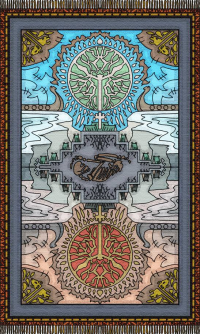 | |
| Religion | |
| Pronunciation | Old-Gods |
| Origins | Old Ceardia |
| Deities | |
| Too many to list | |
Origins
The origins of the Old Gods Religion are somewhat murky, because of intensely conflicting versions. Old Gods as a religion has always lacked an organized hierarchy, and so local communities as well as diasporas do not agree on a common origin tale. While many Regalians consider Old Gods synonymous with the Velheim Culture, they actually are not, and there are more Ceardians who worship Old Gods under the Cellik variant than there are Velheim Old Gods worshipers. Old Gods reaches beyond these cultures however, with Zvorun, Tarkkin, and Dunbrae all having slight variations on the same ideology. All Old Gods worshipers agree that their faith started on the island of Yervonth (called Jerl in old Velheim) however they all disagree with what happened after. Cellik and Velheim Old Gods however are the two largest denominations controlling around 80% of the total worshiper population, and as such, their version is generally accepted as common dogma. Cellik and Velheim Old Gods doctrine claims that when the menace from the west (Nelfin slavers) arrived on the shores of Ceardia, that a group of Pagan Gods created a pantheon together and spirited large communities away from the Ceardian continent, harboring them in safety on the Yervonth island. From here, Old Gods would continue to spread over the world with migration waves, however the further they went, the more their doctrine was changed by local variations and changes. Unlike Unionism, Old Gods never underwent any major cataclysmic changes or schisms. As such, this page will treat the average understanding of Old Gods as fact, though minor local variations like changing a God's name or patron identity is permissible.
Core Identity
Old Gods is a religion that developed out of the old concept of Ailor Paganism in Ceardia, which was a polytheistic religion with a theoretical infinite amount of gods. Old Gods as a religion reformed this principle, attaching itself to the tangible gods that the people could see and interact with, and then centralized religion to them. Old Gods as a religion is centered around the concepts of Honor of the Soul, which is similar to Asaredu, but not strictly bound to combat honor alone, rather to the purity of one's soul as understood through the lens of behavior, actions, and things said. Old Gods worshipers refer to the Honor of the Soul as Soldi. It is actually a common misconception to think that Old Gods worshipers refer to their own religion as Old Gods. This is incorrect, because the term Old Gods was used by Unionists to refer to the faith that was largely replaced in the Archipelago by Unionism. Old Gods is actually referred to as Sjelbyrd by Velheimers or Selbarad by Cellik Old Gods worshipers. Because Ailor kind however has so many varied cultures, and because so few of them still worship the Old Gods, the term Old Gods has simply become commonly used, even by Velheimers when they speak Common.
Tenets
- Bravery: Soldi is gained with bravery, to fight against foes that overwhelm and overpower, to seek out challenges that bring glory and honor to one's family name, and to generally not show cowardice. Soldi is lost by showing cowardice and shirking from one's duties. One must always accept challenges, even if they could result in death or infamy. One must always commit to one's decisions.
- Wroth: Soldi is not strictly gained by being mean or violent, but rather by the idea that one should never give up or simply let things happen that one does not want to happen. Inversely, Soldi is lost by simply being meek and weak and letting events transpire without affecting them. One must never shirk from duties, or show weakness when strength and power are demanded by the public eye.
- Pleasure: The matter of chasteness versus pleasure is not really a matter that demands any Soldi satisfaction. Old Gods worshipers just don't really believe in chastity. That being said, dishonesty and deceit to one's lovers and spouse(s) results in loss of Soldi. One must always remain honest and truthful to those who one spends their life with, and afford them respect as if they are gods themselves.
- Vengeful: Soldi is gained by settling scores, Soldi is lost by letting a vendetta or nemesis simply walk all over one's self. Old Gods worshipers declare Motsaga against a person to declare them their enemy with scores to settle. The Old Gods worshipers came up with the saying "An eye for an eye". If another person is not strong enough to settle their scores, one can offer to do it for them, for Soldi's sake.
- Greed: Soldi is not specifically gained or lost while being charitable or greedy, but Old Gods as a religion generally rewards those who attain and retain the power to seize what they want and be merciful with what they have, but shows little favor on those too weak to make their own destiny. Greed over finances is however not encouraged. Old God worshipers should put little value in money, and more in possessions.
- Honest: Soldi is lost with deceit and lying, though not specifically while withholding information. Old Gods religion has a concept of "white-lies", and only punishes those who tell lies for explicit personal gain or to prevent danger to self (which they must be brave to face). White lies are acceptable if they prevent someone else from losing Soldi, or make everyone happier and easier off in the long run.
- Pride: Soldi is gained when others are aware of how great a person is, and Soldi is lost if a person is forgettable and irrelevant in the scope of history. Old Gods worshipers should endeavor to make sure their skills and talents are always known to others. One should never have paintings or statues made of one's self however. Artistic vanity is considered taboo, one can only accept such gifts made by others.
- Respect: A very important aspect of Old Gods worship is the acknowledgement of respect. While one must be proud of one's self, one must always deeply respect the skills of others, and pay homage to those who are simply better (even if they deserve a challenge here and there). One should never ever pretend like even one's enemies have no qualities or respect worthy aspects about them and one must vocalize them without spite.
- Soldi: The most important aspect of Old Gods is Soldi, which is like a currency of Honor. There is no strict numerical minimum or maximum, but being accused of being without Soldi is the worst insult to levy against an Old Gods worshiper, one that they believe condemns their soul. When someone's Soldi is lost, it is possible for relatives or friends to try and reclaim Soldi for that person by attributing their deeds to them.
- Loyalty: A very important aspect of Old Gods is loyalty, which can mean loyalty to family, to lovers, to one's overlord, one's ruler, or just the gods. Vows of loyalty are taken very seriously, and breaking one is considered a great way to lose all Soldi instantly. In the Regalian context, this usually means loyalty to the Gods, but also loyalty to one's Duke or Emperor depending on one's position.
Beliefs
- Narrative: In Old Gods beliefs, the world is one giant proving grounds for all living things (even wild animals) to prove the value of their soul and prevent loss of Soldi until they die. While all living things are born with Soldi, the effects of evil causes them to commit sins. Sins causing a loss of Soldi are a person's soul showing weakness and thus not having the right to pass into the afterlife. Old Gods dictates that while bodies are made by the gods, and Dragons create a kindling of a soul, that ultimately a soul's development, nurturing, and aging, is entirely up to the person themselves. When a person dies and their soul has enough Soldi they pass into the afterlife or the Valley of Life, which is an idealized version of life with drinking, feasting, and fun. When a person who passes into the Valley of Life also has a hero or legendary status soul through some great achievement or fame in life, they go to the Valley of Legends, which is an upgraded version of this afterlife where their every whim is satisfied. In case a soul is deemed without Soldi, they are condemned to the Mirror world, where the soul wanders for eternity on the salt-flats without color, smell or sound as penance. It is said that some souls have such evil in their hears that they escape the Mirror world, and become Undead in the real world. This is why Old Gods worshipers have such a negative view of Undead who were Old Gods worshipers in a prior life, but are apathetic to Undead from other religions.
- Canon Evil: Canon Evil in Old Gods is called Demons, which takes similar origins as Unionism, but has a more flexible interpretation. On one hand, Old Gods worshipers do acknowledge Demons from the Void, Exist, and Bintaar as evil with corrupting intentions. They refer to them as Betrayers, with one particular Demon called The Great Betrayer being the worst, which scholars believe to be the Arken of Power. Demons seduce people into doing things that ruins their Soldi with promises of power, fame and legend. On the other hand, Old Gods worshipers acknowledge the evil in mortals as a far more realistic source of bad things in life. It is said that the Gods and Dragons made a pact, with the Gods making the bodies of Ailor-kind, and the Dragons providing the breath of life, which would create a seedling of a soul. However, as life develops, the person who the soul belongs to creates the expressions, actions and feelings of the soul themselves as it grows over time, and that evil is simply the person being too weak to hold onto virtues in life and engaging in sin. As such, evil can neatly be defined as either Demons inducing weakness in otherwise strong people, or weakness just existing in a soul because the person themselves are weak.
- Identity: Old Gods dogma has no explicit gender, sex, sexual orientation or gender-identity bias, though it has an implicit male-bias. While any Old Gods worshiper will claim that all genders and sexes are equally fair in their religion, traditional male-coded masculinity takes a unique place that discolors a lot of the nuance about gender. Strong, masculine and emotionless are framed as virtues for men living by the examples of their gods, and so Old Gods society can come across as publicly egalitarian, but having hidden masculine preferences under the surface.
- Conversion: Old Gods as a religion does not require preaching or spreading through missionaries, which is usually a practice reserved for Estellon and Unionism, though to say it is without violent impression is false. Among Old Gods worshipers, holy wars can rage between two distinct populations over small denominational ideals (some as ridiculous as the believed hair color of a god), but bigger conflicts arise with other religions. Old Gods worshipers in general are very intolerant to other religions mostly born out of necessity, because disloyalty to the gods (for example by converting from Old Gods to Unionism) means a complete loss of Soldi and thus a soul being condemned to the Mirror world. Old Gods worshipers have been known to force their faith at the end of a sword and axe, especially in the far north where they are in the majority. Old Gods worshipers also frequently deface religious symbols of other faiths or engage in desecration of holy sites.
- Sins & Taboo: The worst cases of sinning and taboo for Old Gods are disloyalty to god, family and one's leaders, backstabbing, betrayal, deceit for greed's sake, and refusing a challenge of honor or duel of honor and abiding by cowardice. Never does a single sin or transgression cause Soldi to be lost fully, it is more like a currency that slowly leaks away, however repeat offenses do cause eventual loss of Soldi altogether. Old Gods does not really have a central body of priests to condemn a person, but generally speaking, Old Gods communities have a very communal sense of expelling a member when they believe their Soldi to be too far gone.
Gods and Goddesses
Old Gods is a unique religion in that it has two distinct pantheons, one larger Vanir, and one smaller Aesir. The Vanir are what is considered "natural", born from Arne, the Tree of Life, from which all Ailorkind was born (in the eyes of the Old Gods believers). There is no origin story for the world, though it is very much implied that Aerne is actually the world, and that the great tree is only a physical representation of the world's spirit. The Aesir are foreign, entities from a hellish place that have become gods by forcing their way into the Old Gods pantheon. Morality between all these gods is never so clearly black and white, some of the Vanir do reprehensible things for good reasons, or show indifference and silence to the suffering of mortals, while the Aesir are cruel and unforgiving, but grant so much more power to their faithful with a bargain of free will. There are parts of Old Gods society that worship one pantheon while reviling the other, and then there are parts that worship all of them, each in their own way. For more information, consult the Velheim Culture Page. Dragons are somewhat acknowledged in Old Gods folklore, remarking that they were "beings before being", and sat at the roots of Arne before the first birth, they are considered ancient and powerful, but not godlike. Arne does not have a distinct identity of its own, it is more a cosmic force, which is why the Tree of Life is seen as a symbol, nothing more, to the religion. Old Gods both has a Velheim and a Cellik (Cearden) Variant, where the identities are the same, but names differ.
Vanir
The Vanir are created in so called Unions. Nidda and Bev are the Union of Water associated with death, Adal and Dáuw are the Union of Life associated with loss, Bard and Njal are the Union of air associated with power, Gro and Jord are the Union of Life associated with time, Halfvel and Asbjørn are the Union of Mind associated with free-will, Frode and Toke are the Union of Seasons associated with change, Leif and Astrid are the Union of Fire associated with passion, and Hagen and Tove are the Union of Earth associated with thought.
Bev, Mirror of Life
Nidda, Dancer of Death
Adal, Prince of Forgiving
Dáuw, King of Mountains
Bard, King of Bears
Njal, Prince of Art
Gro, Shaper of Flesh
Jord, Forger of Metal
Halfvel, the Father of Demigods
Asbjørn, the Punished Winter
Frode, Carer of Spring
Toke, Lirh of Autumn
Leif, Summer of Passion
Estrid, Queen of War
Hagen, Crafter of Time
Tove, Daughter of Dreams
Aesir
Rand, The Great Betrayer
Odal, Prince of Vengeance
The Nuance of the Great Betrayer
While the Great Betrayer as an entity is considered the supreme evil God by the Old Gods Vanir, his exact relation to them is very nuanced and open to interpretation especially to the Aesir. When the first Old Gods worshipers appealed to their gods to save them from the constant Nelfin raids and attacks on their fledgling communities, the Old Gods were unwilling or incapable of acting to save them. In retrospect, it is likely the case that the Old Gods were simply much weaker than the Estellon Gods, which lends credibility to the idea that not all religious gods are born equal. Gro and Jord however, sought out the Power Arken who supposed did have the power to save the Old Gods from the clutches of the Nelfin, and thus struck a bargain, in which the Old Gods faithful would be kept safe and protected from the Allorn prying eyes and slave fleets, while they would also be given a means to grow and prosper, in exchange for certain liberties. The exact details of the bargain are barely understood in the modern day, because Old Gods dogma was never written down and these events occurred thousands of years ago.
Folklore has it that when the deal was accepted, Gro and Jord were immediately expelled, but that the whole of the Old Gods faithful was absorbed into Vaarda, a dimension seperate from Aloria in which they lived in extreme undying bliss with never ending supplies of food, medicine, and pleasures. From here, the exact actions of the other Old Gods is also quite unclear, though there is some implication that they ended up working with the Power Arken (who was called Rand at this point by them), to "make the best out of a bad situation". After all, while the Gods hated Rand, Bev did make the Vaarda Gates, and supposedly Hagen made the Keystone Artifacts used to open and close the gates. Thus, Old Gods colonization spread across the world like wildfire, because they could travel through Bev's gates in a matter of seconds across vast distances, and had the supplies of Vaarda's orchards and grain fields to support their population boom. At a certain time however, the people realized this was a poisoned fruit, and that there was no way to disagree or criticize Rand, as even though the Gods had been wary of him, the people saw only his blessings at first but turned on him later. They came to realize, that anyone who offended him, had their souls ripped out, and given to him to own. Furthermore, those who would die without honor would be condemned to the Imellomgård, or the "world in between" the living and the afterlife, where they would equally belong to him.
Before long, a revolt brewed, which the Old Gods made use of, thus leading the Old Gods people away from Vaarda and into the open world, while also using the Keystone Artifacts to close Bev's Gates. The legacy of Rand is thus complicated. Rand saved the Old Gods people from being annihilated by the Nelfin slave fleets by hiding them, and also gave them the means to become the most populous of Ailor cultures to spread the furthest across the world. But also, many Old Gods faithful souls were condemned to his Hell (or Hel, the spelling differs from place to place). To this day, he still owns countless souls as his slaves either for offending him, or dying an honor-less cur, thus making him a generally feared evil being who continues to try and pry at the honor of the Old Gods faithful to seduce them to his side. This is supposedly also where Dáuw comes into the picture, as the Dwarves were already in conflict with the Dakkar who were also whipped into a religious frenzy by the Power Arken, thus creating a formal alliance and later merger of the Old Gods and remainder of Dwarven Gods into a single unitary faith.
Trivia
| ||||||||||
| Accreditation | |||||||
|---|---|---|---|---|---|---|---|
|
| ||||||
